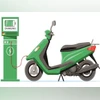In a final attempt to settle the contentious matter stemming from the Department of Heavy Industries’ notice directing 12 electric two-wheeler (e2W) companies to either repay the subsidy or face penal action, the Society of Manufacturers of Electric Vehicles (SMEV) has presented a two-pronged solution.
SMEV has urged the government to extend and defer the 50 per cent localisation deadline, originally set for 2021 as a prerequisite for accessing Faster Adoption and Manufacturing of (Hybrid &) Electric Vehicles in India (FAME-II) subsidies, to the third quarter of 2022, by when most players had already surpassed the 50 per cent localisation criteria.
Additionally, SMEV has proposed that if the department wishes to recover the disbursed subsidies, it should do so by notifying customers about the possibility of reimbursing the money companies have previously transmitted to them.
Affected two-wheeler companies claim that they are in talks with the government to find a mutually agreeable resolution, while also considering the option of moving court. These companies have faced huge financial losses, and several large units have shut down for lack of capital.
The first suggestion, if accepted, would ensure that problems arising from the pandemic or other factors would no longer be considered violative, necessitating the repayment of subsidies to the government.
In a letter to Minister of Heavy Industries M N Pandey, SMEV has highlighted that the ministry has on four occasions granted extensions to e2W original equipment manufacturers concerning the localisation deadline under the phased manufacturing programme (PMP), mainly due to the challenges in establishing the required supply chain for fledgling electric two-wheeler players to meet the localisation criteria, which were particularly hindered by the severe impact of the pandemic.
Without a clear explanation, the PMP clause’s deadline for 2021 was not extended, even though the pandemic’s impact persisted.
To put it simply, the supply chain anticipated to develop by 2019 under FAME-II only matured in the third quarter of 2022. In contrast, the department granted a full one-year extension on localisation norms to passenger cars in 2021, revealing a clear bias.
The association has also voiced concern over the differing treatment of two categories of e2Ws. One group, comprising Ola Electric, Ather Energy, TVS Motor Company, and Hero MotoCorp, was found engaging in price-fixing to take advantage of the subsidy scheme by bundling the charger with the scooter.
Despite violating rules and policies since 2020 in contravention of the law, their subsidies were not discontinued, nor were they required to return past subsidies. They were instead permitted to continue their operations unhindered.
SMEV has also drawn the minister’s attention to the fact that the allegations against the manufacturers are not related to the use of subpar or cheap components procured from the local grey market to cut costs. Instead, they pertain to the acquisition of high-quality, costly imported components for lack of an existing or ready local supply chain capable of accommodating small orders.
THE ELEVENTH-HOUR SOLUTION
• Push deadline for implementing localisation norms to be eligible for subsidy from 2021 to third quarter of 2022
• Department of Heavy Industries should approach consumers seeking reimbursement of the government subsidy passed on to them
• Passenger cars were given one-year extension in 2021 from PMP rules, but this was not extended to electric two-wheelers
• Top four electric scooter manufacturers being treated differently from the pioneers in the business, indicating clear bias for similar alleged violations for subsidy eligibility
Unlock 30+ premium stories daily hand-picked by our editors, across devices on browser and app.
Pick your 5 favourite companies, get a daily email with all news updates on them.
Full access to our intuitive epaper - clip, save, share articles from any device; newspaper archives from 2006.
Preferential invites to Business Standard events.
Curated newsletters on markets, personal finance, policy & politics, start-ups, technology, and more.
)